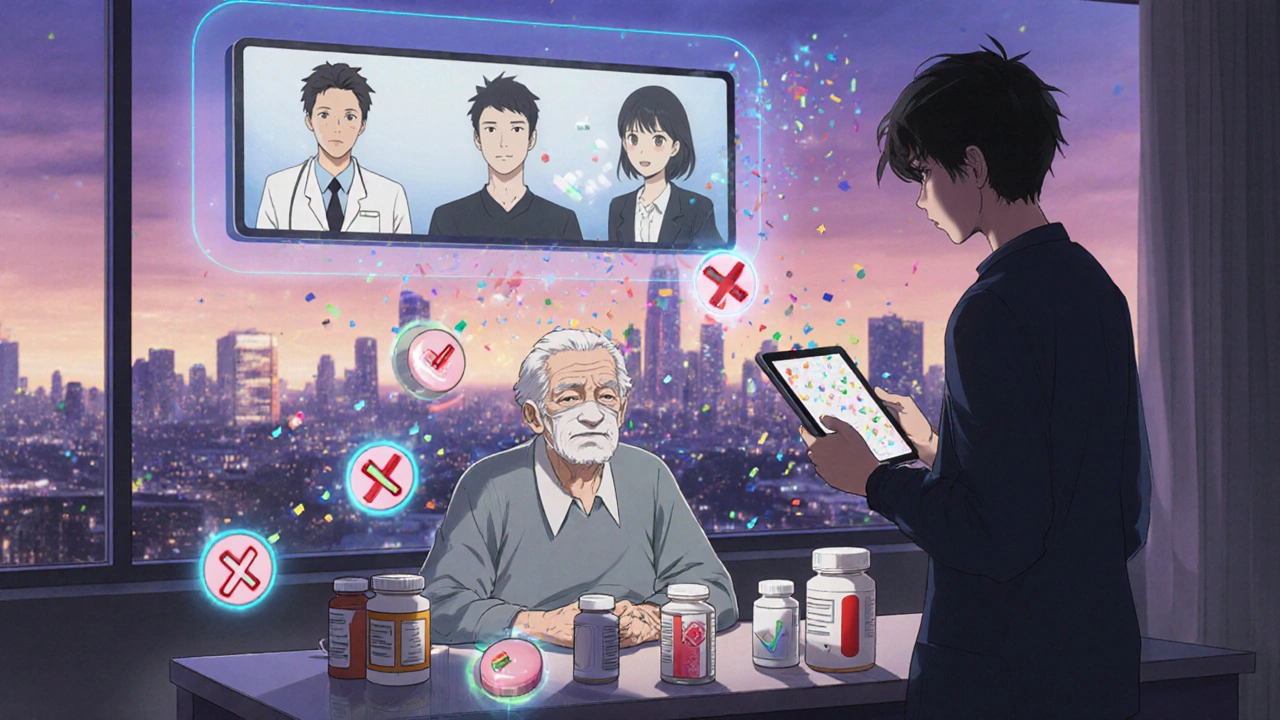
Why a medication review isn’t just another doctor’s visit
You’re taking pills for your blood pressure, your diabetes, your cholesterol, maybe a painkiller here and there, plus a few vitamins and herbal supplements you picked up at the store. It’s easy to forget which one does what, when you take it, or why you even started. That’s where a medication review comes in - it’s not a checkup, it’s a safety net.
Every year, thousands of people end up in emergency rooms because of bad drug interactions, wrong doses, or medicines that no longer help. A medication review stops that before it happens. It’s when your doctor or pharmacist sits down with you and goes through every single thing you’re taking - not just prescriptions, but everything. And if you don’t show up prepared, you’re wasting your time and putting your health at risk.
What exactly happens in a medication review?
A medication review isn’t a quick nod and a refill. It’s a full audit. Your healthcare provider will look at:
- Which medicines you’re taking, and why
- Whether any are no longer needed
- If doses are still right for your age, weight, or health changes
- How your medicines interact with each other
- Any side effects you’ve noticed - even if you think they’re normal
- Whether you’re actually taking them as prescribed
In New Zealand and the UK, these reviews are standard for people taking five or more medications. That’s called polypharmacy, and it’s not unusual for older adults or those with chronic conditions. But even if you’re on just three, it’s worth checking. Some medicines lose effectiveness over time. Others might be causing fatigue, dizziness, or confusion you’ve just learned to live with.
What you need to bring: The complete medicine list
This is non-negotiable. You must bring everything you take - not just what’s on your prescription list. That includes:
- All prescription pills and liquids
- Over-the-counter painkillers like paracetamol or ibuprofen
- Vitamins, minerals, and supplements (even the ones you only take once a week)
- Herbal remedies - ginger pills, echinacea, St. John’s Wort
- Inhalers, creams, eye drops, patches
- Any medications you stopped taking recently
Don’t rely on memory. Bring the actual bottles. Even if they’re empty. A pharmacist can read the labels, check expiration dates, and spot if you’ve been taking the wrong dose. If you’re on a phone or video call, have everything laid out on the table in front of you. You can’t show your meds through the screen, so have them ready before the call starts.
Write down the details - don’t guess
Write a simple list with these details for each medicine:
- Name of the medicine (use the label, not what you call it)
- Dose (e.g., 10 mg, 2 sprays, 1 cream twice daily)
- Why you take it (e.g., “for high blood pressure,” “for joint pain”)
- When you take it (e.g., “with breakfast,” “at bedtime”)
- Who prescribed it (doctor’s name or specialist clinic)
- Any side effects you’ve noticed (e.g., “feels dizzy after lunch,” “constipated since starting this”)
Don’t leave anything out. One patient brought a list of 12 medicines - but forgot the magnesium supplement she took for muscle cramps. That one caused a dangerous interaction with her heart medication. It wasn’t on her prescription list, so no one knew about it.

Think about your goals - what do you want to change?
A good medication review is a conversation, not a lecture. Ask yourself:
- Is there a medicine you’d like to stop because it causes side effects?
- Are you taking too many pills and wish it was simpler?
- Do you forget doses because your schedule is too complicated?
- Have you noticed your symptoms getting worse - maybe your meds aren’t working anymore?
Write down one or two things you want to talk about. For example: “I feel tired all the time since I started the new cholesterol pill.” Or: “I’m scared of falling - could any of these make me dizzy?”
Don’t be shy. Your provider has heard it all. The more honest you are, the better they can help.
What if you can’t get to the clinic?
If mobility is an issue, or you live far away, you’re not out of luck. Many practices now offer telehealth medication reviews. But you need to prepare differently.
- Test your video or phone connection before the appointment
- Have all your medicines in one place, clearly labeled, on a table beside you
- Ask if you can send photos of your medicine bottles ahead of time
- Have a family member or caregiver sit with you during the call to help remember details
Some clinics even offer home visits for patients who can’t travel. You have to ask for this - they won’t offer it unless you say something. Call your practice and say: “I’m having trouble getting to appointments. Can I get a home-based medication review?”
What happens if you skip your review?
Some practices in New Zealand and the UK have strict rules. If you ignore three reminders for a medication review, they may stop giving you repeat prescriptions. That’s not punishment - it’s safety. Without knowing what you’re taking, doctors can’t safely refill your meds. They risk giving you something that interacts dangerously with something you’re already on.
It’s not about control. It’s about keeping you alive. One study found that patients who missed their medication reviews were 40% more likely to be hospitalized for drug-related problems.

Special cases: Parkinson’s, elderly patients, and cognitive changes
If you have Parkinson’s, timing matters more than ever. Some medications need to be taken within 30 minutes of each other, or they won’t work. Missing a dose by an hour can make you stiff and unable to move. Bring a written schedule showing exact times for each pill.
For older adults or those with memory issues, it’s smart to have a family member or caregiver join the appointment. They can help remember side effects or changes in behavior you might not notice yourself.
Also, don’t assume that if you’re on a lot of meds, you’re stuck with them. Many older patients can reduce their list - safely - by stopping things that no longer help or that overlap in effect.
After the review: What to expect
At the end, your provider should tell you:
- Which medicines to keep
- Which ones to stop or lower
- Which ones to change
- What new medicines, if any, you need
- When to come back
They should give you a written summary. Keep it. Show it to your pharmacist. Put it on your fridge. If anything changes - you start a new medicine, feel worse, or have a fall - call your clinic. Don’t wait for your next scheduled review.
Final tip: Make this a habit
Don’t wait until you’re in crisis to get a medication review. Set a reminder in your phone for once a year. Even if you feel fine. Even if you think you’re doing fine. Medications change how your body works over time. What helped last year might be hurting you now.
A medication review isn’t about being told what to do. It’s about taking control. It’s about making sure the pills you take are helping - not hiding in your cabinet, gathering dust, or making you sicker.
Do I need to bring all my medicine bottles, even if they’re empty?
Yes. Empty bottles still have the label with the name, dose, and prescribing doctor. Pharmacists use this to confirm what you’ve been taking, even if you stopped. If you don’t have the bottle, bring the prescription slip or a photo of the label.
Can I just ask my pharmacist instead of my doctor?
Absolutely. Many practices now have clinical pharmacists who specialize in medication reviews. They spend 30-45 minutes with you, compared to a doctor’s 15-20. They’re trained to spot interactions, reduce pill burden, and simplify your regimen. Ask your clinic if a pharmacist-led review is available.
What if I’m taking herbal supplements or vitamins?
They count. Herbal remedies like St. John’s Wort can interfere with antidepressants. High-dose vitamin K can make blood thinners less effective. Even fish oil can increase bleeding risk if you’re on aspirin. List them all - no matter how “natural” they seem.
I’ve been on the same meds for 10 years. Why review now?
Your body changes. Your kidneys and liver slow down with age. Your weight might have changed. New research shows some older drugs aren’t as safe as we thought. What was fine in your 60s might be risky in your 70s. A review isn’t about changing things for no reason - it’s about making sure what you’re on still matches your current health.
Can I bring a friend or family member to the appointment?
Yes, and you should. People often forget what’s said in appointments. A second set of ears helps. They might remember side effects you didn’t notice, or ask questions you didn’t think of. Just let the clinic know in advance if someone’s coming with you.
Write a comment
Your email address will not be published.





12 Comments
i just brought my pill bottles to my appt last week and the pharmacist was like 'wow, you're taking 17 things?' i had no idea. i thought i was being careful. turns out i was just drowning in pills. thanks for the reminder to actually look at what's in my cabinet.
this is so true!! 🙌 i help my mom with her meds and we do this every 6 months now. she used to forget half of them. now we have a little box with labels and a checklist. life changed! 🌿💊
oh sure, let the state dictate what pills you can keep. next they'll be auditing your tea and turmeric. they don't care if you're fine. they care about liability. this is how they control the elderly. they want you dependent. they want you scared.
The irony of this article is that it assumes patients are rational actors who can accurately self-report their medication adherence. We live in a world where people take ibuprofen like candy, forget their blood pressure meds because they 'felt fine,' and think 'natural' means 'safe.' This is a Band-Aid on a hemorrhage. The real problem is the pharmaceutical-industrial complex that profits from polypharmacy, not the patient who forgot to bring their ginseng.
I'm sorry, but this is just another performative healthcare ritual designed to make providers feel productive while the system continues to overprescribe. You're being told to 'bring everything'-but no one ever asks why you were prescribed ten different antihypertensives in the first place. Who's auditing the prescribers? Who's auditing the pharmaceutical reps who handed out those samples? You're being asked to clean up a mess you didn't make.
Ah yes, the classic 'bring your empty bottles' directive. So helpful. Next they'll want you to bring the receipt from the 2018 CVS trip where you bought melatonin because you 'couldn't sleep.' I mean, really. The real issue? The system doesn't track anything properly. Why should I? It's all just paperwork theater.
In America, we don't need this. We have the best doctors in the world. You think they don't know what you're taking? They've got your whole history in the system. This is just bureaucratic overreach. Bring your bottles? That's what they do in Europe. We're not Europe. We're America. We fix things faster.
I’ve been doing this for years now with my dad who’s got Parkinson’s. It’s not just about the pills-it’s about the rhythm. He needs his levodopa at 7:00, 11:00, 3:00, and 7:00 sharp. Miss one by 20 minutes and he’s stuck on the couch for hours. We keep a whiteboard by the fridge with times, names, and what they’re for. It’s not fancy, but it keeps him moving. I think everyone should do this-even if they’re young. It’s not about fear. It’s about respect for your own body.
OMG YES!! I brought my 14 bottles last time and the pharmacist literally gasped 😱 She said I was taking 3 things that did the exact same thing. I was like... why?? She cut 5 pills and I have more energy now 🙌💖 #medicationcleanse
I must commend the thoroughness of this guide. It reflects a commendable alignment with best practices in clinical pharmacology, particularly in jurisdictions with established polypharmacy protocols such as those in the UK. However, one must consider the socioeconomic heterogeneity of patient populations. Not all individuals have access to stable lighting, internet connectivity, or familial support to facilitate telehealth reviews. The document, while excellent, assumes a level of infrastructural privilege that is not universally applicable.
I used to think this was all just busywork until my uncle had a stroke because his blood thinner interacted with the ginkgo biloba he was taking 'for memory.' He didn't tell anyone because he thought it was 'just a supplement.' Turns out, 'natural' doesn't mean 'safe'-it just means 'unregulated.' I now carry my meds in a ziplock bag everywhere. Even to the grocery store. Just in case.
my grandma in nigeria used to say: 'if you don't know what you're putting in your body, you're playing roulette with your life.' she didn't have a doctor, but she had a notebook. wrote down every herb, every tea, every pill. i do the same now. simple. no fancy app needed.